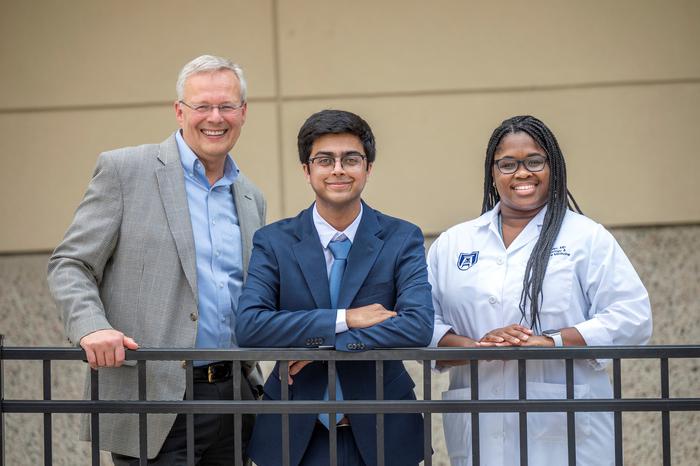A unique program that sees students at the Medical College of Georgia working as anesthesia technologists throughout their four years of medical school can influence more of them to pursue the specialty as a career, investigators report.

Credit: Michael Holahan, Augusta University
A unique program that sees students at the Medical College of Georgia working as anesthesia technologists throughout their four years of medical school can influence more of them to pursue the specialty as a career, investigators report.
The MCG Department of Anesthesiology and Perioperative Medicine’s nearly 100-year-old Externship Program is one of only five or six in the country and allows interested medical students to work nights, weekends and holidays, as a critical part of the anesthesia and operating room teams. Anesthesia techs are typically responsible for sterilizing, cleaning, assembling, calibrating, testing and troubleshooting various pieces of machinery in the operating room. Students in the externship program also routinely perform airway management, maintain vascular access and help perform rapid transfusions in emergent cases.
“This program was actually started in 1938 by our first chair Dr. Perry Volpitto, and originally it was designed to get medical students to fill the demand for additional anesthesia techs and personnel,” says fourth-year MCG student Farhan Lakhani, corresponding author of the study in the British Journal of Anesthesia. “Now it’s a program where medical students are paid an hourly rate and given the same job responsibilities as a daytime tech. You are offered more clinical responsibilities and educational opportunities. You’re also able to build trust and relationships with the people in the department, all of which is valuable in developing a sense of belonging to the health care team and contributing to the professional development of medical students into physicians.”
The externship, which students can start as early as the first year of medical school, is mutually beneficial for students and the department, says study senior author Dr. Caryl Bailey, assistant professor and director of the anesthesiology clerkship for medical students. “In addition to giving students anesthesia experience, it gives them perioperative experience, so the program is useful for students who are not only interested in anesthesia, but in almost any surgical subspecialty,” she says. “It gets them used to the operating room environment, and learning team dynamics. We are also getting very engaged and interested workers. They want to stay around. They want to learn, so they tend to be more present in the operating room.”
The program also ultimately translates to more anesthesiologists, the authors found.
Of 38 current and former MCG externship participants, only 12 – or 32% — were interested in anesthesia as a career before they took part in the program. That number climbed to 21 – or 55% – who chose anesthesia as their specialty after their externship.
“The Anesthesia Externship Program’s success in recruitment to anesthesia can be attributed to the opportunity for clinical responsibility, including observing the administration of anesthesia, which helps students form a picture of their future career,” the authors write.
“There is obvious benefit to our department and to our specialty, and very importantly, I think it gives our medical students who are interested in anesthesia a running start,” says Dr. Steffen Meiler, department chair. “When our students start their residency, either here or elsewhere, they are already familiar with the nuts and bolts of providing anesthesia and the workflows in a complex operating room environment. There is no doubt that when I am reviewing applications for our residency program that participation in our anesthesia externship is a strong positive.”
While there are only a handful of externship programs in the country, Meiler also hopes this study will help that number grow. “This is a very high impact journal, and we can clearly demonstrate the long-term value of an externship program like ours,” he says. “I hope this article will increase the interest among other academic anesthesia departments in establishing a similar medical student-focused experience.”
Farhan Lakhani, who is currently serving as chief extern, will complete medical school in May 2024 and hopes to pursue a residency in anesthesiology.
Read the study.
Journal
British Journal of Anaesthesia
Article Title
Impact of a paid, longitudinal anaesthesiology externship programme on developing medical students into anaesthesiologists
Article Publication Date
8-Aug-2023




